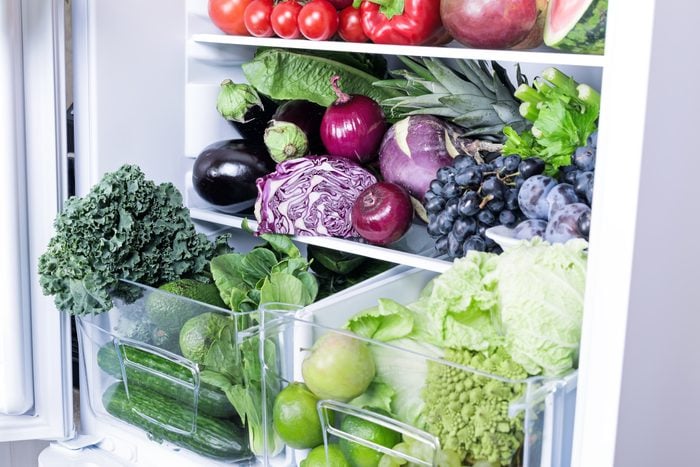
The secret to longer-lasting produce
When we’re cruising around the grocery store, it feels good to toss a wide variety of fruits and vegetables into the cart. Most of the time, we return home and stow everything in the fridge without paying much attention to our fridge organization or fruit and vegetable storage techniques, aiming to eat all of it within a few days. But often life gets in the way, and when we get around to eating that healthy produce, it’s rotten or simply tastes bad. Why? It all comes down to what fruit and veggies not to store together.
Here, we’re breaking down which fruits and vegetables you should keep separate in order to limit food waste, which items to avoid storing on the counter and which are safe to keep out of the fridge. In the end, you’ll know how to save money—and make your food taste better—by maximizing the storage life of your produce.
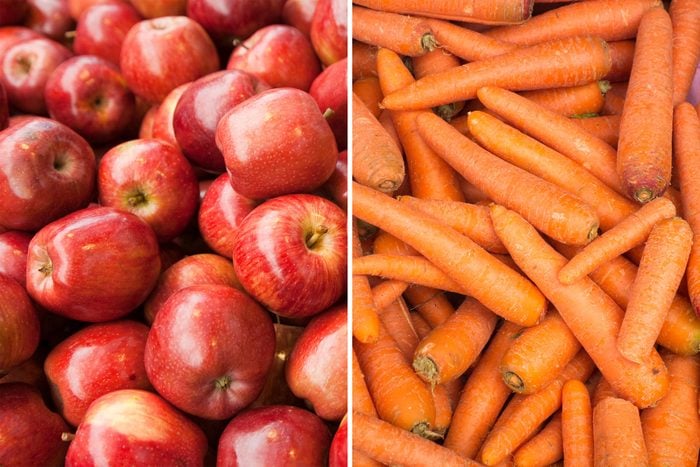
Apples and carrots
“Fruits and vegetables tend to give off odors that are absorbed by other produce or foods,” explains Taylor C. Wallace, PhD, the chief food and nutrition scientist at the Produce for Better Health Foundation. Along this spectrum are those that are particularly pungent and those that are super absorbers. Find out why you should store your apples in the fridge.
“The classic example is apple odor,” says Wallace. “And carrots tend to be particularly good at absorbing odors from other produce.”
For this reason, he suggests keeping apples and carrots away from each other, adding that cabbage, figs and onions can also absorb an apple’s odor. “The closer and more enclosed the fresh produce is, the more chance for odors to intermix,” he adds.
Storage tip: Invest in some food storage containers that you can use to contain your produce while keeping them separate in the fridge.
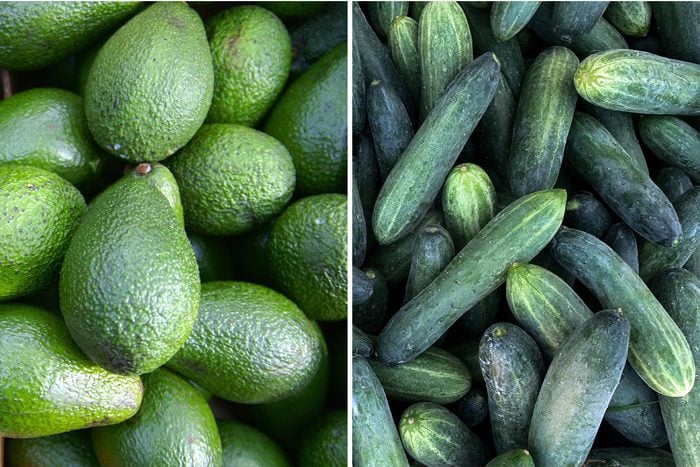
Avocados and cucumbers
When it comes to what fruit and veggies not to store together, these salad staples definitely make the list. The reason: Avocados are climacteric fruit, and cucumbers, while technically a fruit, are non-climacteric. “Climacteric fruits will continue to ripen after they are harvested because they produce high amounts of ethylene gas,” Wallace explains. “Non-climacteric fruits and vegetables produce very little [if any] ethylene gas and do not continue to ripen after they are picked or harvested.”
If you store ethylene-producing produce with ethylene-sensitive produce, the latter can over-ripen, becoming soft and spoiling faster.
Instead, store avocados on their own or near other climacteric fruits (if you plan to enjoy them as soon as they are ripe), such as apples, tomatoes, cantaloupes, pears and peaches. Store cucumbers with other non-climacteric veggies, like leafy greens and root vegetables.
Storage tip: Don’t buy cucumbers in bulk. Instead, purchase what you’ll realistically eat for the week. “Cucumbers purchased in the grocery store typically contain a protective wax coating,” says Wallace. “Storing them too long in the refrigerator can give them a bad texture.”
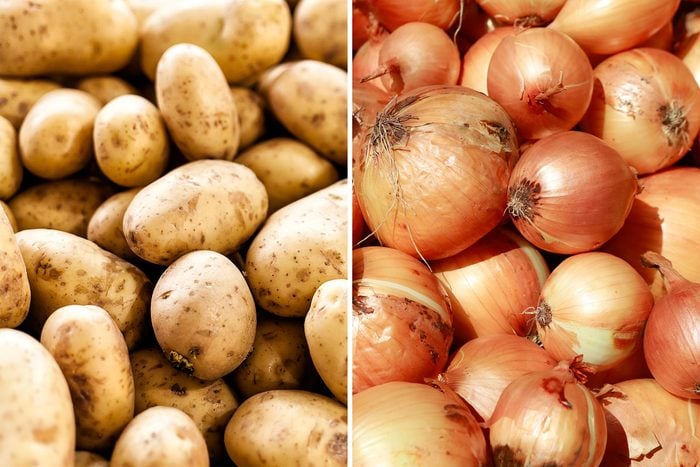
Potatoes and onions
Potatoes and onions are both ideally stored in cool, dark environments, but it’s best to keep them apart because onions are ethylene producers. “The ethylene gas will cause the potato to sprout,” says registered dietitian Amy Myrdal Miller, MS, RDN, a culinary and food-service specialist.
Potatoes can also absorb odors from the foods around them, including onions. “While onions pair well with potatoes from a flavor perspective, storing them together can cause your potatoes to take on the flavors of onions, which may not be desirable, depending on what you’re making with the potatoes,” Miller adds, noting that the same is true of garlic.
To extend the life of your potatoes, store them in a basket or open container, and don’t wash them until right before using them. And store onions in a cool, dark, well-ventilated place.
Storage tips:
- Pop onions in the refrigerator for at least 30 minutes before slicing, and they won’t make your eyes water quite as much.
- If you need to store a partially used onion but are worried about the scent, grab an onion-specific storage container.
- Put some baking soda in the fridge to absorb the pungent onion scent.
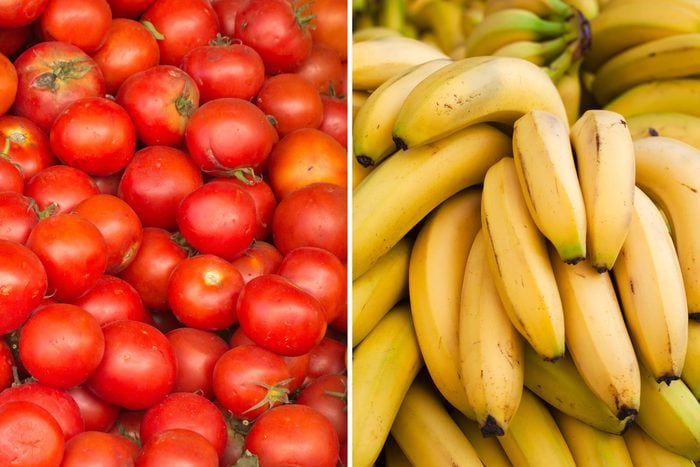
Tomatoes and bananas
Tomatoes and bananas have a lot in common: They are both ethylene-producing climacteric fruits, can help you fight cancer and are best stored on the counter at room temperature. So it’s safe to keep them in the same bowl on your kitchen island, right? Not so fast.
This pair is actually on the list of what fruit and veggies not to store together. Fruits and vegetables that do a lot of ripening after they’re picked, such as tomatoes, bananas, kiwis and honeydew melons, are best stored apart. If you keep them too close to one another, the large amounts of ethylene they produce can lead to accelerated ripening. Before you have a chance to enjoy them, they’re ready for the compost bin.
Storage tip: Want to speed up the ripening process of one of these foods? Go ahead and store it next to another ethylene producer. Storing tomatoes like this allows them to be ripe and ready for your sandwich in no time.
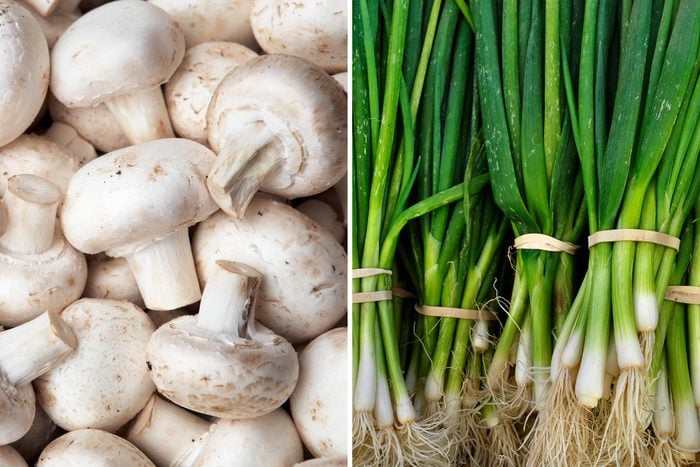
Mushrooms and scallions
Like their yellow and red onion cousins, scallions (which are the same as green onions) give off a strong odor. Mushrooms, on the other hand, are highly absorptive—of water and oil as well as smells. If you store your mushrooms in the crisper drawer alongside scallions, they will begin to absorb the mild onion flavor and taste less like themselves when you pull them out to eat.
When considering how to store these foods, think about how long you plan to keep them before eating. “Storing produce for less than three to four days minimizes odor production,” says Wallace.
Storage tip: If you aren’t planning to use your mushrooms for five days or more, keep them away from the scallions and in their original cardboard container or a paper bag—mushrooms need a dry environment, and these containers will soak up excess moisture where a plastic bag would not.
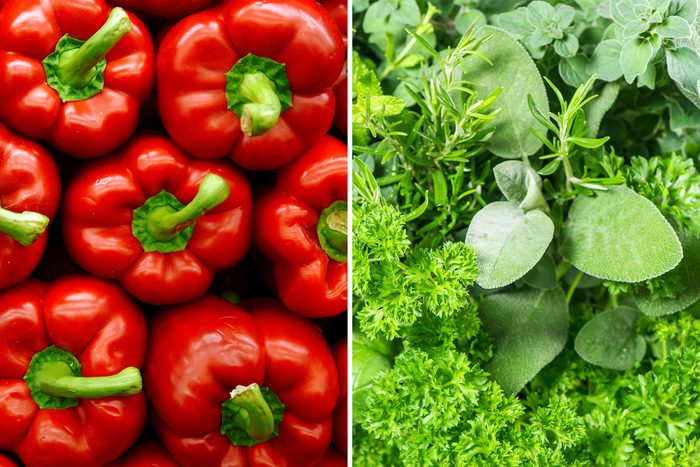
Bell peppers and fresh herbs
Bell peppers are a relatively hearty and low-maintenance vegetable, and they’re safe to toss into your fridge without much care. But if you do the same when storing fresh herbs, you’ll be disappointed when it comes time to use them.
Storage tip: “Herbs, particularly the tender green ones [like cilantro] can be quite fragile,” explains Wallace. “If you are using the herbs soon, clip off the bottom of their stems, remove any wilted or brown leaves, put them in a jar with a little water in the bottom and place [them] in the refrigerator.” This not only keeps them fresh and flavorful but also prevents them from getting bruised or crushed beneath heavier veggies in your crisper drawer—like bell peppers.
Get Reader’s Digest’s Read Up newsletter for more food, humor, cleaning, travel, tech and fun facts all week long.
Sources:
- Taylor C. Wallace, PhD, CFS, FACN, chief food and nutrition scientist at the Produce for Better Health Foundation
- Amy Myrdal Miller, MS, RDN, FAND, culinary and food-service specialist at the Produce for Better Health Foundation
- Produce for Better Health Foundation: “About the Buzz: Certain Fruits and Vegetables Should Not Be Stored Together?”
- PennState: “Savvy Consumers Can Sniff Out Odor-Absorbing Produce”
